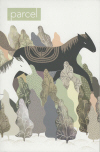Parcel – Spring 2013
The magazine Parcel is a city of mirages, each component story its own minaret and long stretch of shadow. One such structure is Rebecca Emanuelsen’s short exercise “Transmissions.” I found it especially evocative of the power of allegory. The characters channel various spirits from different continents and eras. We have the brooding Bronte men and the sequestered Burnett children, the precocious du Maurier innocents and the brittle old women who will always transcend time with the ultimate lubricant of such travel—old money. I felt that Emanuelsen teased this reader too much with allusion, where the word “quite” infected the page and the aforementioned characters did seem borrowed from other casts, but she wrote a story I couldn’t put down. The premise is that of a bookseller who becomes entrapped in a strange thread. (Yes, it leads her to an unexpected peace, but you won’t guess where). Her opening is perfect: “Olette wakes one morning to find a string running taut from her left ear canal out through the crack beneath her bedroom door. She sits up and touches the place where the thread connects to her head, perplexed by its presence.”
The magazine Parcel is a city of mirages, each component story its own minaret and long stretch of shadow. One such structure is Rebecca Emanuelsen’s short exercise “Transmissions.” I found it especially evocative of the power of allegory. The characters channel various spirits from different continents and eras. We have the brooding Bronte men and the sequestered Burnett children, the precocious du Maurier innocents and the brittle old women who will always transcend time with the ultimate lubricant of such travel—old money. I felt that Emanuelsen teased this reader too much with allusion, where the word “quite” infected the page and the aforementioned characters did seem borrowed from other casts, but she wrote a story I couldn’t put down. The premise is that of a bookseller who becomes entrapped in a strange thread. (Yes, it leads her to an unexpected peace, but you won’t guess where). Her opening is perfect: “Olette wakes one morning to find a string running taut from her left ear canal out through the crack beneath her bedroom door. She sits up and touches the place where the thread connects to her head, perplexed by its presence.”
In a Kafkaesque vein, the story romps on, marrying surrealism with very tactile concerns such as the business of bookselling and the executive management of someone else’s heartbreak. It is a great example of plot succeeding to match certain key touchstones of the past—development, dramatic action, conflict—in a modern context where we have elements of pastiche, ethereal parody and, yes, allusion to Europe’s great Romantic writers.
At sixty-five pages, Parcel is slim, with its editorial leanings toward the archetypal. The poetry is closer to Williams’s plums than Stevens’s blackbirds, and the syntax and vocabulary could be classed as more readable than the Times or even the Post. While the publication is fine on the whole, I found Travis Smith’s “Thank You Anonymous Sponsor” and Danielle Shutt’s “Seasonal Thing (For William, Who Won’t Appreciate It)” especially compelling. The world, frankly, is in need of more love songs, and I thought Shutt managed a very clear pitch amid her rice and salt and starscapes. The objects she invokes, like Smith’s patented nouns, are not unusual, but cultivated for inclusion somehow. Each writer takes the ordinary word and makes it overwhelmingly new. Take the start of Smith’s poem:
thank you anonymous sponsor
for the alphabet like atoms
for what you mixed in
with the wind today
this higher-proof this aquavit wind
I wouldn’t be surprised to see
shavings of light blown off
from magnolia leaves like shingles
to see the e ripped from hello
out of a passerby’s mouth
Of course the “e” could be ‘postmodern,’ but the writer does not seem to angle for classification; these poems are not meditations on the state of letters in America today. Neither poet expressly abandons the notion that we are the stewards of the alphabet or, like Shutt, that this particular love song is different than what came before. But they are driven, perhaps, by a kind of necessity, that perhaps the forgotten angry men of France are still angry today, even when they are channeled from a small press in Kansas.
Because the tightrope of this style writing is gossamer, the journal is worth further study. For example, I’ve been studying Hemingway, and when I read Parcel for a kind of counter-point, I realized how challenging it is to say something profound in geologic language. The critics have observed that there isn’t always an easy way to describe American writing, that we lack the vernacular for it. If that is the case, then it is good to reach out and try and find the expression that suits you best—find the words that adhere to a compelling philosophy of language for you, your loved ones, and a rainy day.
[parcelmag.org]





